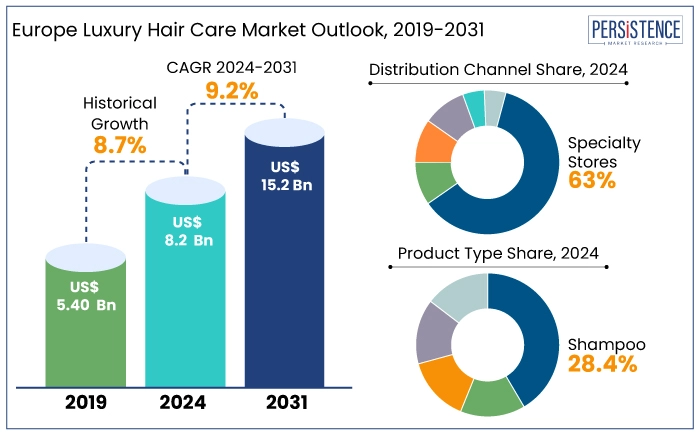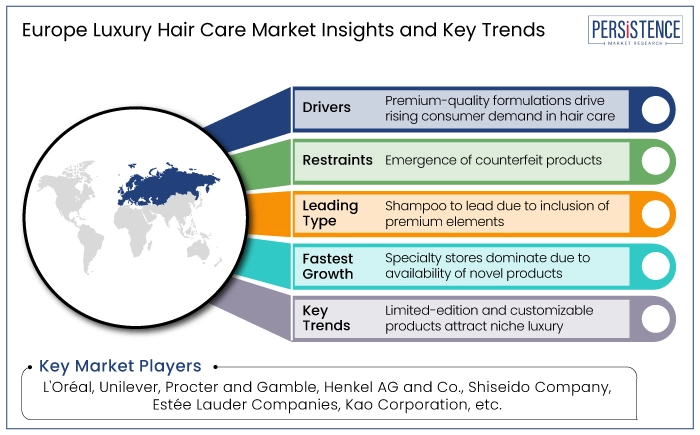Industry: Consumer Goods
Published Date: December-2024
Format: PPT*, PDF, EXCEL
Delivery Timelines: Contact Sales
Number of Pages: 181
Report ID: PMRREP34972
The Europe luxury hair care market is estimated to increase from US$ 8.2 Bn in 2024 to US$ 15.2 Bn by 2031. The market is projected to record a CAGR of 9.2% during the forecast period from 2024 to 2031.
In Europe, the trend of personalized beauty is rising as customers look for solutions that are specific to their own hair types and requirements. Unique technologies like Artificial Intelligence (AI) are used by luxury hair care brands like Prose and Function of Beauty to create novel formulations. These would help increase the products' exclusivity and attractiveness. The popularity of customization has surged demand for high-end products among wealthy, tech-savvy consumers.
London-based Monpure, for instance, focuses on luxury scalp and hair health products designed to address individual concerns like thinning hair and sensitive scalps. The brand offers consultations to recommend the ideal products from its range.

Key Highlights of the Market
|
Market Attributes |
Key Insights |
|
Europe Luxury Hair Care Market Size (2024E) |
US$ 8.2 Bn |
|
Projected Market Value (2031F) |
US$ 15.2 Bn |
|
Europe Market Growth Rate (CAGR 2024 to 2031) |
9.2% |
|
Historical Market Growth Rate (CAGR 2019 to 2023) |
8.7% |
|
Category |
Market Share in 2024 |
|
Distribution Channel- Specialty Stores |
63% |
In 2024, specialty stores generated a market share of 63% in Europe. These stores focus on offering an exclusive, carefully curated selection of premium hair care products, providing customers with access to top-tier brands.
By emphasizing exclusivity, specialty stores attract discerning shoppers looking for high-quality, luxury hair care solutions that are not available in mass-market outlets. This well-chosen strategy enhances the store’s reputation as a destination for the best-in-class products.
The stores further help in ensuring a unique and personalized shopping experience. As customers continue to seek premium and niche products, specialty stores are poised to maintain their dominance in generating significant revenue in the Europe luxury hair care market.
|
Category |
Market Share in 2024 |
|
Product Type- Shampoo |
28.4% |
Based on product type, the shampoo segment will likely hold a share of 28.4% in 2024. As luxury shampoos offer superior formulas and are frequently enhanced with premium elements like keratin, botanical extracts, and natural oils, customers are ready to spend money on them. With professional results, these shampoos are made to target particular hair issues including frizz, damage, and scalp health. For several customers, the perceived efficacy and decadent experience of luxury items outweigh the high price point. For example,
The Europe luxury hair care market is witnessing dynamic growth, fueled by a rising preference for premium, high-performance hair care solutions. Consumers are increasingly seeking products tailored to specific needs, such as scalp health, hydration, and anti-aging benefits.
Sustainability is a central theme, with brands emphasizing eco-friendly packaging and ethically sourced ingredients. E-commerce platforms are gaining prominence, offering convenience and a broad range of products, driving market accessibility.
Social media and influencer marketing are playing pivotal roles in shaping consumer preferences and boosting brand visibility. Additionally, innovations in technology, including molecular-level treatments and specialized scalp-focused products, are revolutionizing the industry. These trends, coupled with growing disposable income, position the market for sustained innovation and long-term expansion.

The Europe luxury hair care market experienced steady expansion at a CAGR of 8.7% from 2019 to 2023. It was driven by increasing consumer interest in premium, personalized solutions addressing specific hair concerns.
Rising awareness of hair health and the growing influence of social media have significantly bolstered demand for luxury products. The shift toward natural and sustainable formulations has further reinforced consumer trust and brand loyalty in Europe. For instance,
Future growth is anticipated to be supported by continuous innovation in product development, including unique technologies and eco-friendly practices. Rapid expansion of online retail channels and the adoption of digital marketing strategies are projected to enhance market accessibility, ensuring consistent growth. Emerging markets across Europe are further poised to become significant contributors.
Rising Shift toward Personalized Hair Treatment Options to Push Demand
Increased awareness of hair health and personalized treatments is a significant driver for the Europe high end hair products industry. Consumers are becoming more informed about the importance of maintaining healthy hair and addressing individual needs such as scalp health, hair hydration, damage repair, and anti-aging concerns. This shift is supported by widespread access to educational content through social media, beauty influencers, and brand campaigns.
Personalized treatments tailored to specific hair types and conditions are gaining popularity as they promise better results compared to generic products. Innovations like AI-driven diagnostic tools and customized formulations are enhancing consumer engagement. The growing preference for products that combine luxury with efficacy has further propelled demand, establishing personalized hair care as a key market trend. For instance,
Innovations in Product Formulations and Technologies to Spur Demand
Developments in product formulations and technologies are key growth drivers for the Europe luxury hair care market. Innovations, such as molecular treatments and ingredients targeting specific hair and scalp issues, are attracting consumers seeking effective and high-performance solutions.
Brands are incorporating cutting-edge technologies like AI to analyze hair types and recommend personalized products, enhancing the customer experience. Sophisticated formulations, including sulfate-free shampoos, botanical extracts, and nutrient-rich serums, cater to the demand for natural and sustainable solutions. For instance,
The use of novel delivery systems also ensures better absorption and improved results. These innovations are set to propel the luxury appeal of products, allowing brands to differentiate themselves and meet the evolving expectations of discerning consumers.
High Costs of Luxury Products to Limit Consumer Affordability
High costs limiting consumer affordability pose a significant challenge for the Europe luxury hair care products industry. Premium products often feature unique formulations, high-quality ingredients, and sustainable packaging, which increase production costs and retail prices. While affluent consumers may prioritize luxury hair care, a considerable segment of potential buyers finds these products financially out of reach. For instance,
Economic uncertainties and fluctuating disposable incomes further restrict spending on non-essential, high-cost items. Additionally, the availability of affordable alternatives in the mass-market segment diverts price-sensitive consumers. This affordability gap limits market penetration, particularly in emerging or price-conscious areas, hindering the adoption of luxury hair care solutions.
Availability of Counterfeit Hair Care Products to Hamper Demand
The availability of counterfeit luxury hair care products significantly impedes market growth in Europe by undermining brand reputation and consumer trust. These fake products often mimic the packaging and branding of established luxury brands, misleading consumers into purchasing inferior and potentially harmful alternatives.
Counterfeit items, sold at lower prices through unregulated channels, compete directly with authentic products, particularly in price-sensitive markets. Consumers who unknowingly use these substandard products may experience adverse effects, leading to dissatisfaction and eroding confidence in luxury brands. For example,
The proliferation of counterfeit items is facilitated by e-commerce platforms and social media, where monitoring and enforcement are challenging. This issue not only results in revenue losses for legitimate companies but also increases their costs for anti-counterfeiting measures and legal actions, further straining market dynamics.
Investment in Sustainable and Eco-friendly Product Lines Creates Avenues
Investment in sustainable and eco-friendly product lines presents a promising opportunity for the Europe luxury hair care market. With growing consumer awareness of environmental issues, there is a rising demand for products made from ethically sourced ingredients and packaged in biodegradable or recyclable materials.
Brands that prioritize sustainability can attract eco-conscious customers, enhance brand loyalty, and differentiate themselves in a competitive market. Additionally, adopting sustainable practices aligns with regulatory trends promoting green initiatives, ensuring long-term viability.
Innovations such as waterless formulations and refillable packaging further appeal to environmentally aware consumers. By committing to sustainability, companies can drive growth while contributing positively to the environment and meeting evolving consumer expectations. For example,
Brands Focus on Men's Luxury Hair Care Products to Gain Profit
Exploring niche markets, such as high-end men's hair products, offers significant growth opportunities for Europe-based brands. Traditionally overlooked, men's grooming needs are gaining recognition as male consumers increasingly seek specialized products tailored to their hair concerns, such as thinning, dandruff, and styling. This shift is fueled by changing social attitudes, growing self-awareness, and the influence of male-focused marketing campaigns.
Brands that introduce high-quality, personalized solutions for men can tap into this underexplored segment, driving sales and surging market reach. Offering exclusive ranges, such as premium shampoos, styling products, and treatments designed for men, allows companies to diversify their portfolios and address evolving consumer preferences. Targeted branding and strategic partnerships can further solidify presence in this lucrative niche. For example,
The Europe luxury hair products industry is characterized by the presence of several key players striving for market share through innovation and strategic initiatives. Companies like L'Oréal and Unilever have reported significant sales growth, driven by their premium product lines.
Brands are also focusing on sustainability, personalized solutions, and technological developments to meet evolving consumer preferences. The competitive environment is further intensified by the entry of new brands and the expansion of existing ones into emerging markets.
Recent Developments in the Europe Luxury Hair Care Market
|
Attributes |
Details |
|
Forecast Period |
2024 to 2031 |
|
Historical Data Available for |
2019 to 2023 |
|
Market Analysis |
US$ Billion for Value |
|
Key Regions Covered |
|
|
Key Market Segments Covered |
|
|
Key Companies Profiled |
|
|
Report Coverage |
|
|
Customization and Pricing |
Available upon request |
By Product Type
By Consumer Orientation
By Distribution Channel
By Country
To know more about delivery timeline for this report Contact Sales

The market is set to reach USD 8.2 Bn in 2024.
The industry is being propelled by increasing consumer demand for premium products and trend for personalized treatments.
L'Oréal, Unilever, Procter and Gamble, Henkel AG and Co., and Shiseido Company are the leading players.
The market is projected to rise at a CAGR of 9.2% from 2024 to 2031.
A prominent opportunity in Europe lies in the development of sustainable and eco-friendly product lines.